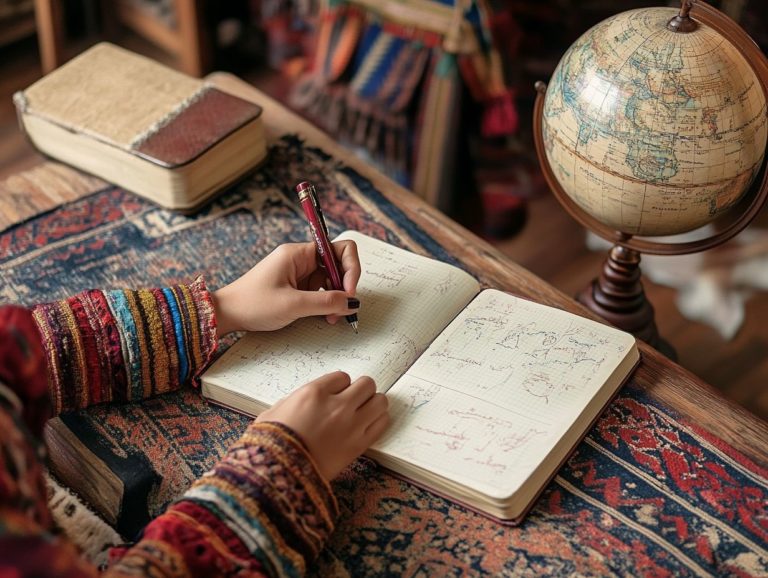Cultural Adjustment: The Emotional Roller Coaster
Cultural adjustment often resembles an emotional roller coaster, presenting a myriad of highs and lows as you navigate unfamiliar environments and experiences. This guide is designed to accompany you through the various stages of this journey, covering everything from preparation and coping strategies to identifying common challenges you may face along the way.
Delve into the significance of seeking support and uncover valuable resources that promote your emotional well-being. Embrace the enriching benefits of cultural differences, and discover the fascinating complexities and rewards that cultural adjustment can bring into your life.
Contents
- Key Takeaways:
- The Stages of Cultural Adjustment
- Preparation for Cultural Adjustment
- Common Challenges in Cultural Adjustment
- Seeking Support during Cultural Adjustment
- Embracing the Cultural Experience
- Frequently Asked Questions
- What is cultural adjustment and why is it often referred to as an emotional roller coaster?
- What are some common challenges that people face when adjusting to a new culture?
- How long does it typically take for someone to fully adjust to a new culture?
- What are some ways to cope with the emotional ups and downs of cultural adjustment?
- Is it normal to experience culture shock during the adjustment process?
- Are there any positive aspects to the emotional roller coaster of cultural adjustment?
Key Takeaways:

- Embracing cultural adjustment can be an emotional journey with distinct stages, including excitement, culture shock, adaptation, and acceptance.
- Proper preparation and ways to handle change can help mitigate the challenges of cultural adjustment, such as homesickness, language barriers, and cultural differences.
- Seeking support from available resources and tools, such as counseling, mentorship, and community groups, can greatly aid in the emotional roller coaster of cultural adjustment.
The Stages of Cultural Adjustment
The stages of cultural adjustment present an important journey that you may embark on when relocating to a new country, often depicted by the U-Curve (a model showing stages of adjustment) or W-Curve Model, which captures the emotional highs and lows of this experience.
At first, you might find yourself in an exhilarating honeymoon phase, brimming with excitement and curiosity about the new culture surrounding you. However, as you move forward, you re likely to confront initial culture shock, which can introduce various stress symptoms and emotional challenges that may impede your adaptation process.
Grasping these stages is essential for your successful cultural integration and personal growth.
Overview of the Emotional Journey
The emotional journey of cultural adjustment resembles an emotional roller coaster, where mental isolation and stress often emerge as you navigate through various phases of adaptation. During this phase, you may feel lonely and confused as you grapple with the loss of your previous life.
At first, homesickness can hit you hard, manifesting as a deep yearning for familiar surroundings, friends, and family. As time goes on, you may find yourself transitioning into an acceptance phase, beginning to embrace your new environment and forging connections with local communities. However, challenges will still arise, including moments of doubt or cultural misunderstandings, highlighting the need for emotional strength and a solid support system.
Ultimately, this journey underscores the intricacies of human emotion, with each experience contributing to your evolving identity in a new cultural landscape.
Preparation for Cultural Adjustment
Thorough preparation for cultural adjustment can greatly facilitate your transition. By equipping yourself with the right tools, you can effectively manage communication barriers and skillfully navigate the cultural differences you may encounter in your new environment.
Strategies for Coping with Change

Developing effective strategies for coping with change is essential for minimizing stress symptoms and facilitating your adjustment process during cultural transitions. These strategies can greatly enhance your overall well-being and promote a smoother integration into your new environment.
Practices like mindfulness can help you stay centered amidst uncertainty, enabling you to navigate your emotions and thoughts more effectively. Building strong support systems whether through friends, family, or local community groups fosters a sense of belonging, providing you with the emotional support you need during challenging times.
Engaging in community activities not only opens doors for personal growth but also nurtures friendships that can alleviate feelings of isolation. By adopting these coping mechanisms, you can transform your experience into a rewarding journey of discovery and connection.
Don t miss out on the chance to embrace cultural adjustment and the opportunities it presents!
Common Challenges in Cultural Adjustment
Common challenges in cultural adjustment can present you with unique hurdles, especially when it comes to navigating the dynamics of your relationship.
The differing societal norms and expectations in your new environment can create distinct obstacles for couples, requiring thoughtful consideration and adaptation.
Identifying and Addressing Difficulties
Identifying and addressing challenges in cultural adjustment is crucial for people living abroad. These difficulties often lead to stress management issues arising from cultural differences and feelings of mental isolation.
Recognizing these challenges early on can greatly ease your transition process. It allows you to adapt more effectively to your new surroundings.
Engaging in open communication with peers, mentors, or support groups can create a sense of belonging and understanding.
By sharing your experiences and feelings, you validate your struggles and learn from others’ coping strategies.
Taking proactive steps, such as setting realistic expectations and seeking professional guidance during the acceptance phase, can empower you significantly.
Ultimately, these actions can transform your cultural experience into a rewarding journey.
Seeking Support during Cultural Adjustment
Seeking support during the cultural adjustment process is crucial for you as a person living abroad. It helps you navigate your journey with greater ease.
Dive into a world of resources that will supercharge your experience adapting to a new culture.
Resources and Tools for Emotional Support

Utilizing a variety of resources and tools for emotional support can significantly enrich your expat experience. This will help you feel less isolated and more connected to your new culture.
Consider joining support groups specifically designed for expatriates. Here, you can share your experiences and coping strategies while cultivating a sense of community.
Online platforms are also invaluable, offering virtual spaces for discussions, advice, and friendships as you navigate the complexities of cultural adjustment.
Local organizations frequently provide workshops and events that encourage deeper engagement with the native culture. This makes it easier for you to find your footing.
By actively participating in these supportive environments, you can foster meaningful connections, alleviate feelings of loneliness, and gain invaluable insights into both your new surroundings and yourself.
Embracing the Cultural Experience
Embracing the cultural experience is a transformative journey for you as a person living abroad. It not only helps you integrate into your new surroundings but also promotes personal growth.
Benefits of Cultural Adjustment and Growth
The benefits of cultural adjustment go far beyond mere survival. They pave the way for profound personal growth, enhanced understanding of cultural differences, and the ability to dismantle communication barriers you once thought were insurmountable.
As you immerse yourself in diverse cultural environments, you ll likely uncover new perspectives that enrich your emotional intelligence and adaptability.
This journey invites you to cultivate a deeper appreciation for varied traditions and values, fostering empathy and resilience in the face of change.
As you navigate through different social norms and practices, you may find your interpersonal skills and confidence blossoming.
Ultimately, embracing cultural diversity not only broadens your worldview but also nurtures meaningful relationships, empowering you to thrive in an increasingly interconnected global society.
Frequently Asked Questions
Start your adventure today by connecting with local communities!
What is cultural adjustment and why is it often referred to as an emotional roller coaster?

Cultural adjustment refers to the process of adapting to a new culture or environment. It is often referred to as an emotional roller coaster because it can involve a range of intense emotions, such as excitement, confusion, frustration, and homesickness.
What are some common challenges that people face when adjusting to a new culture?
Common challenges include language barriers and adjusting to different customs.
People may also experience homesickness, feel out of place, and adapt to a different pace of life.
How long does it typically take for someone to fully adjust to a new culture?
The amount of time it takes for someone to fully adjust to a new culture varies. Individual factors such as prior cultural experiences, personality, and the level of cultural differences can all play a role. It can take anywhere from a few months to a year or longer.
What are some ways to cope with the emotional ups and downs of cultural adjustment?
Coping strategies include:
- Seeking support from friends and family.
- Joining cultural or community groups.
- Practicing mindfulness and self-care.
- Considering professional counseling if needed.
Is it normal to experience culture shock during the adjustment process?
Yes! Culture shock is when you feel confused or uneasy in a new place, and it happens to many people. Understanding this is crucial it is a temporary and natural reaction to the stress of adapting to a new culture.
Are there any positive aspects to the emotional roller coaster of cultural adjustment?
Absolutely! While it can be challenging, the emotional roller coaster of cultural adjustment also allows for personal growth, increased resilience, and the opportunity to learn about and appreciate different cultures. Embrace these ups and downs they’re opportunities to learn and connect with new cultures!






